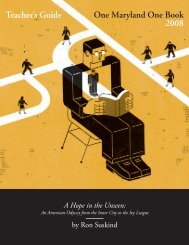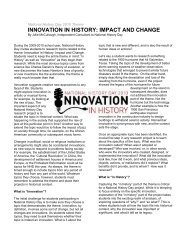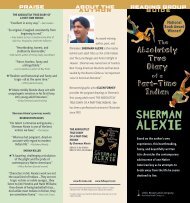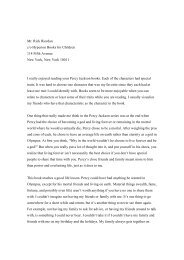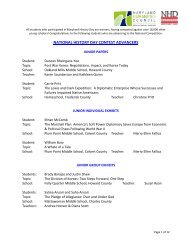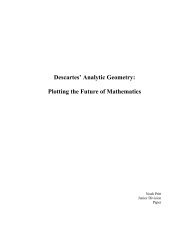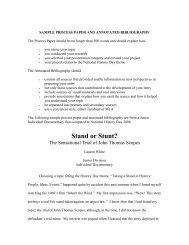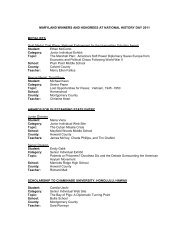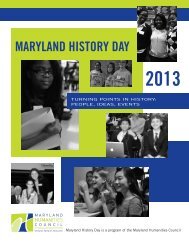1 State Humanities Councils Mission, Vision, Values Statements The ...
1 State Humanities Councils Mission, Vision, Values Statements The ...
1 State Humanities Councils Mission, Vision, Values Statements The ...
Create successful ePaper yourself
Turn your PDF publications into a flip-book with our unique Google optimized e-Paper software.
cultural barriers. We continue to use the humanities as a tool for social change and to provide culturalenrichment opportunities through programs and grants for Mainers of all ages and abilities.MassachusettsMass <strong>Humanities</strong> supports programs that use history, literature, philosophy, and the other humanitiesdisciplines to enhance and improve civic life throughout the Commonwealth.Mass <strong>Humanities</strong> regularly identifies areas of special interest or concern and develops initiatives aimedat increasing program activity in those areas. Our current thematic initiative, "Crisis, Community andCivic Culture," encourages applicants to explore the confluence of challenges that has led to today'sfraying of the social contract as well as the history and promise of collective action organized inresponse to a variety of crises.Previous Mass <strong>Humanities</strong> initiatives have focused on the interpretation of Native American history andculture in New England museums and historical societies, the contributions of women to public life inMassachusetts; and humanistic perspectives on the millennium, and the interplay of "liberty" and"justice" as two fundamental principles of American political life.What are Mass <strong>Humanities</strong>' Priorities? Mass <strong>Humanities</strong> gives highest priority to projects that apply thehumanities to current issues, deepening public understanding of these issues and thereby enhancingcivic life.MichiganOur <strong>Mission</strong> - <strong>The</strong> Michigan <strong>Humanities</strong> Council’s mission is to connect people and communities byfostering and supporting quality cultural programs.In carrying out its mission, the Council encourages and supports a variety of activities that bringcommunities, students and scholars together to:• reflect and learn from our rich cultural heritage;• cultivate a shared understanding and appreciation of each other, as well as current issues andevents;• build stronger, more thoughtful communities for the future.<strong>Mission</strong>-driven activities include:• awarding grants for public humanities and cultural programs;• conducting public humanities and cultural projects of statewide importance;• serving as a connector, convener and facilitator for bringing community cultural organizationstogether to build capacity and achieve shared missions;• initiating collaborations and partnerships to broaden and strengthen the organizational andinstitutional base for the humanities in Michigan; and• providing the humanities with leadership and a public voice in Michigan.8
MissouriMHC is committed to helping build a thoughtful, informed and engaged society through programsassociated with encouraging family reading, supporting local museums, libraries, and otherorganizations promoting humanities education, facilitating the sharing of our stories, and generatingpublic conversation on topics including history, religion, archaeology, anthropology, philosophy,literature, law and languages. We help Missourians experience the connection between ideas andparticipatory democracy, and to expand understanding of our own culture as well as the world beyondour boundaries. Dedicated and creative people are the most important resources of our institutions andcommunities: the programs and experiences we support through grants and consultation services helpunlock energies that will enrich our lives and contribute to a better appreciation of both our differencesand what we hold in common.Our <strong>Vision</strong>:<strong>The</strong> Missouri <strong>Humanities</strong> Council helps Missourians expand understanding of ourselves, our democraticsociety, and the world, by encouraging the open exchange of ideas in community life.MinnesotaMontana<strong>Humanities</strong> Montana believes in the capacity of the humanities—history, literature, philosophy,religious studies, ethics, and more—to• Stimulate reflection• Create knowledge• Resolve problems• Inspire delight.• We provide and support public programs that• Explore issues of enduring and contemporary concern• Encourage critical thinking• Examine civic issues• Deepen our understanding of where we have been, where we are, and where we are going.<strong>Vision</strong> - <strong>Humanities</strong> Montana will enrich the lives of all Montanans by fostering inquiry and stimulatingcivil and informed conversations about the human experience.North Dakota<strong>Mission</strong> - W e invest in the people of North Dakota by creating and sustaining humanities programsthat provide us with a better understanding of the past, a better analysis of the present,and a better vision for the future.<strong>Vision</strong> - <strong>The</strong> humanities inspire our vision of a thoughtful, respectful, actively engaged society thatwill be able to meet the challenge of sustaining our democracy across the many divisions of10
modern society and deal responsibly with the shared challenges we currently face as members ofan interdependent world.<strong>Values</strong>• W e hold ourselves accountable for developing an understanding of and appreciation for thehumanities that can• transform the way we, as North Dakotans, see our communities and ourselves. To this end:• W e believe in lifelong learning as essential for a thriving democracy• W e believe in accessible, high quality humanities programs for all• W e believe in everyone's right to be listened to and heard• W e believe in the practice of critical thinking• W e believe in collaborations that foster our fullest potential• W e believe in acknowledging the past and in respecting its First Peoples as a path to abetter futureBecause democracy demands thoughtful and informed citizens, the North Dakota <strong>Humanities</strong> Counciluses the tools of literature, history, philosophy and ethics to create an intelligent and engaged nation.<strong>The</strong> North Dakota <strong>Humanities</strong> Council is an independent state affiliate of the National Endowment forthe <strong>Humanities</strong>. <strong>The</strong> NDHC, and the other 55 state and territorial councils, were founded by the federalgovernment on the premise that, “An advanced civilization must not limit its efforts to science andtechnology alone, but must give full value and support to the other great branches of scholarly andcultural activity in order to achieve a better understanding of the past, a better analysis of the presentand a better view of the future.” Simply put, a nation that does not know why it exists, or what it standsfor, cannot long be expected to flourish. In this vein, the NDHC uses the tools of history, literature,philosophy, ethics, and archeology to illuminate what we as a nation and as individuals stand for andwhy. <strong>The</strong> NDHC supports public initiatives that create opportunities to think critically aboutfundamental issues of the human experience in order to understand and enhance American culture.NebraskaWhen we ask who we are and what our lives ought to mean, we are using the humanities. <strong>The</strong> Nebraska<strong>Humanities</strong> Council enhances the quality of life in communities across our state through programs thatstudy the human race, its achievements, its creations, its dreams and aspirations, its failures andtriumphs. <strong>The</strong> NHC promotes a better understanding of Nebraska–who we are and where we havebeen–to build a better future.NevadaNevada <strong>Humanities</strong> creates public programs and supports public projects statewide that define theNevada experience and facilitate the exploration of issues that matter to Nevadans and theircommunities. With offices in Reno and Las Vegas, Nevada <strong>Humanities</strong> is one of 56 state and territorialhumanities councils affiliated with the National Endowment for the <strong>Humanities</strong>.11
Programs sponsored by Nevada <strong>Humanities</strong> provide opportunities for Nevadans to read widely, thinkdeeply, and become engaged in their community.New HampshireOur <strong>Mission</strong> - <strong>The</strong> mission of the New Hampshire <strong>Humanities</strong> Council is to offer essential opportunitiesfor discovery, self-reflection, and lifelong learning by fostering civil discourse and bringing ideas from thehumanities to the people of New Hampshire. We connect people with ideas.Our <strong>Vision</strong> - <strong>The</strong> New Hampshire <strong>Humanities</strong> Council nurtures the joy of learning and inspirescommunity engagement by bringing life-enhancing ideas from the humanities to the people of NewHampshire.<strong>The</strong> humanities are those fields of inquiry that explore the heart of the human experience. <strong>The</strong>y help usexperience and remember the power of ideas in a world where family, community, and career are in aconstant state of flux. <strong>The</strong> humanities include but are not limited to literature, history, languages, ethics,philosophy, comparative religion and culture, and the interpretation of the arts.Our <strong>Values</strong> - <strong>The</strong> NHHC’s vision, mission, goals and actions are informed by a set of core values thataffirm its best traditions and embody its aspirations for the future. <strong>The</strong> NHHC’s core values are theunfettered pursuit of knowledge, understanding and self-awareness; integrity; quality; community anddiversity; connection to culture, history, and place; cooperation; the importance of inspiration;accessibility; and a belief that education is essential to the vitality of each individual and of ourcommunities, our state, and our nation.<strong>The</strong> NHHC promotes the fundamental value of the unfettered pursuit of knowledge, understanding, andself-awareness. <strong>The</strong> form and content of NHHC programs will be consistent with the value of free andopen inquiry, employing approaches that embody open-mindedness, tolerance, objectivity, impartiality,reason, and reflection. NHHC programs will encompass a wide range of issues, will not advocate aparticular point of view, will provoke thought, and will encourage the active exploration of a variety ofperspectives.<strong>The</strong> NHHC strives to assure integrity in all of its decisions, actions, and programs. Integrity is a guidingvalue not only in its programming -- in which the NHHC encourages exploration of moral and ethicalquestions -- but in relationships within the NHHC and with its many stakeholders.<strong>The</strong> NHHC is committed to delivering programming of the highest quality, characterized by effective andengaging methods of presentation and learning, high standards for content, and honest assessment ofeffectiveness. NHHC programs emphasize participation, the development of civil discourse skills, andinterdisciplinary approaches where appropriate.12
<strong>The</strong> NHHC is dedicated to forming and sustaining community, including communities of interest andaffiliation and communities defined by physical proximity, such as neighborhoods and towns. To instilllifelong habits of civic and social responsibility and to overcome social isolation, the NHHC encouragesengagement in the life of the community, respect for diversity of backgrounds and viewpoints, andactive participation in civil discourse.<strong>The</strong> NHHC promotes the understanding of New Hampshire’s culture, history, and sense of place. <strong>The</strong>NHHC also strives to broaden its constituents’ knowledge, perspectives and understanding of the humancommunity throughout history and around the globe.<strong>The</strong> NHHC seeks to form strong and lasting bonds of cooperation with its many constituencies andstakeholders, including program participants, scholars, program partners, funders, the media, and thestate’s cultural and educational institutions.<strong>The</strong> NHHC believes in the importance of inspiration and strives to feed the human spirit by encouragingintellectual curiosity and creativity.<strong>The</strong> NHHC strives to make its programs accessible to all, regardless of age, gender, race, ethnicity, socioeconomicstatus, or location. It is particularly mindful of extending humanities programs to the leastadvantaged, including those who are most isolated from society and those who face a barrier toknowledge as a result of illiteracy.<strong>The</strong> NHHC believes that education is essential to the vitality of each individual, our communities, ourstate, and our nation. <strong>The</strong> NHHC is committed to working with K-12 educators in support of excellencein the teaching of the humanities in New Hampshire schools.New Jersey<strong>The</strong> mission of the NJCH is to develop, support and promote projects that explore and interpret thehuman experience, foster cross-cultural understanding and engage people in dialogue about matters ofindividual choice and public responsibility. <strong>The</strong> Council's Horizons Speakers Bureau supplies lecturers tononprofit organizations in humanities areas as wide ranging as ethnic studies, history, literature,interpretation of the arts, and public policy. Clemente Courses offer high-quality, post-secondaryeducation in the humanities to young adults in New Jersey's underserved communities who have thepotential to succeed in college.New Mexico<strong>Mission</strong> <strong>State</strong>ment and Goals<strong>The</strong> New Mexico <strong>Humanities</strong> Council (NMHC) encourages and supports the humanities by seeking outand funding quality humanities programs for presentation to and participation by diverse publicaudiences throughout New Mexico. Thought, learning, and experience must be shared. This is what itmeans to be human.13
NMHC remains committed to the substance of its statements of mission and goals as follows:• to support quality projects and programs which engage humanities scholars and public audiences ina dialogue on topics and issues appropriate to the humanities;• to enhance the civic and cultural life of New Mexico's citizens through it projects and programs;• to provide easy access to quality humanities programs for citizens and communities throughoutNew Mexico; and• to strive for diversity in the humanities disciplines, formats, humanities scholars, and publicaudiences involved in NMHC projects and programs.New York Council for the <strong>Humanities</strong><strong>The</strong> mission of the New York Council for the <strong>Humanities</strong> is to help all New Yorkers become thoughtfulparticipants in our communities by promoting critical inquiry, cultural understanding, and civicengagement.What does it mean to be human? This question has given rise to the fields known collectively as “thehumanities,” which examine what humans have created, debated, done and believed throughout themillennia. <strong>The</strong> skills and methods of the humanities—reading, analysis, discussion, critical thinking;about history, ideas, arts, texts—help connect us to one another and to lead meaningful lives.<strong>The</strong> Council’s vision is to create a vibrant, growing public humanities community that engages all NewYorkers in civic participation, volunteerism, philanthropy, and community involvement, and reconnectspeople to our rich state and local history.North Carolina<strong>Mission</strong> - <strong>The</strong> North Carolina <strong>Humanities</strong> Council serves as an advocate for lifelong learning andthoughtful dialogue about all facets of human life. It facilitates the exploration and celebration of themany voices and stories of North Carolina’s cultures and heritage.<strong>The</strong> <strong>Humanities</strong> Council develops among North Carolinians an understanding of and appreciation for thehumanities that can transform the way they see themselves and their communities. In support of thesegoals, the <strong>Humanities</strong> Council is committed to the following:• an interdisciplinary approach to the humanities• dialogue• discovery and understanding of the humanities--culture, identity, and history• respect for individual community members and community values• humanities scholarship and scholars to develop humanities perspectives• cultural diversity and inclusiveness• informed and active citizenship as an outgrowth of new awareness of self and community<strong>Vision</strong> - <strong>The</strong> North Carolina <strong>Humanities</strong> Council envisions people who explore their personal andcollective stories asking fundamental questions about identity, work, and culture; learning to value14
others’ stories and perspectives; and transforming their lives and communities through new reflectionsand new visions.OhioOHC’s mission is “to increase Ohioans’ appreciation and understanding of the humanities” through theCouncil’s grantmaking capacity and through programs developed by the Council itself. Based inColumbus but operating statewide, the Council has a small staff which provides assistance to grantapplicants, oversees Council-developed programs, and promotes the humanities in Ohio throughcollaborations with cultural and educational institutions.<strong>The</strong> Ohio <strong>Humanities</strong> Council encourages all Ohioans to explore the human story, to use history,philosophy, and the other humanities as the means to arrive at new insights.Oklahoma<strong>Mission</strong> - <strong>The</strong> mission of the Oklahoma <strong>Humanities</strong> Council (OHC) is to promote meaningful publicengagement with the humanities.About Our WorkWe strive to stimulate discussion, inform new perspectives, and actively engage people in lifelonglearning. Our strategic plan targets two critical areas of need in our state: K-12 humanities educationand community building. We address these needs through the following programs:• Grants for humanities programming and research• Reading programs that bring people together to discuss books and ideas• Traveling exhibits that take the museum experience to rural areas• Lectures and living history programs that foster community dialogue and connect people with ourfinest scholars• Classroom programs that engage students with history and literature• Teacher institutes that promote excellence in K-12 educationKey <strong>Values</strong> -OHC recognizes that engagement with the humanities offers people inspiration and hopeand can tell true and powerful stories about what life and human behavior mean. <strong>The</strong> humanities helppeople to forge strong connections, recognize commonalities, promote justice and tolerance, andengage in civic life.OregonOur <strong>Mission</strong> - Oregon <strong>Humanities</strong> connects Oregonians to ideas that change lives and transformcommunities.Our Work - Oregon <strong>Humanities</strong>’ programs and publications provide a forum for individuals andcommunities to raise questions, challenge assumptions, listen to others, and think critically about the15
issues that directly affect their lives and those of the people around them. Our programs are designed toinspire insights, or what we call “O. Hm.” moments.<strong>The</strong> Impact of Our Work - <strong>The</strong> impact of this work is profound—participants listen, question, rethink,and consider more deeply and, as a result, act from a place of knowledge, compassion, connectedness,and personal responsibility.How We Work - We strive to be a catalyst and facilitator for thoughtful conversations by being:• accessible and approachable, inviting Oregonians with varied perspectives and experiences toparticipate;• committed to collaborating and building partnerships with other organizations;• responsive to history and the issues that directly impact the lives of Oregonians;• provocative, providing programs and publications that stimulate thought and challenge people toconsider alternative points of view.<strong>The</strong> <strong>Humanities</strong> - <strong>The</strong> humanities are more than the disciplines that document past and present humanexperience—history; literature; language; ethics and philosophy; and various legal, cultural, religious,and folk traditions. <strong>The</strong> humanities are dynamic, prompting action on our part and encouraging us toinvestigate, speak, listen, read, reflect, think, and act. We experience change through the humanities.We can become open, empathetic, understanding, and compassionate, or even disturbed, challenged,and enlightened. By engaging with and through the humanities, we grow.PennsylvaniaExploring the Human Experience: Yesterday, Today and TomorrowOur <strong>Mission</strong> - PHC inspires individuals to enjoy and share a life of learning enriched by humanexperience across time and around the world. Through programs and partnerships, PHC fosters thesharing of stories and ideas — to increase understanding and a large vision of human life, communityand possibility.Rhode Island<strong>The</strong> mission of the Rhode Island Council for the <strong>Humanities</strong> is to inspire and support intellectual curiosityand imagination is all Rhode Islanders.<strong>The</strong> founding purpose of the Rhode Island Council for the <strong>Humanities</strong>, which remains largely unchangedtoday, is to promote public understanding and appreciation of the tradition of thought andaccomplishment that we call the humanities. Our work is based on the conviction that history, literature,philosophy, civics, the arts and other fields of the humanities are central not only to formal education,but to the daily lives of free and diverse people.16
As our world continues to pose new challenges to us, whether it be through innovation, design, oraccident, our community needs opportunities to reflect, listen, and learn from each other in order tomake educated decisions about where we go next.Enter the public humanities. <strong>The</strong> humanities are those aspects of our cultural life that help usunderstand ourselves and the world around us, and in doing that, help us make wiser decisions in ourpersonal lives and as citizens. At the Rhode Island Council for the <strong>Humanities</strong>, we strive to bring thebenefits of the broad base of humanities knowledge and research to the public in an effort to grow anappreciation for the humanities in our community, to make them relevant, and to bring scholars andcommunity members together in an engagement of active citizenship.South Carolina<strong>Mission</strong> - To enrich the cultural and intellectual lives of all South Carolinians.<strong>Vision</strong> – To be recognized for the inspiring, engaging and enriching public humanities programs andinitiatives.Purpose - <strong>The</strong> <strong>Humanities</strong> Council SC seeks to increase public understanding of and support for thehumanities; telling the human story by awarding grants for high-quality public programs, by generatingspecial humanities initiatives, and by bringing humanities perspectives to bear on contemporary issues.<strong>Values</strong> – <strong>The</strong> <strong>Humanities</strong> Council SC Programs and Initiatives are balanced, reflecting sensitivity to thediversity of ideas, encourage open dialogue, demonstrate integrity and are ethical in operations.South Dakota<strong>The</strong> South Dakota <strong>Humanities</strong> Council (SDHC), founded in 1972 in response to an act of Congress, is theonly cultural organization in the state whose sole mission is to deliver humanities programming to thepeople of South Dakota. As a steward of the state's cultural awareness and heritage, the Councilcultivates statewide interest in South Dakota history, literature and other related humanities subjects,while stimulating an interest in the state's place as part of the universal human experience. Thisprogramming vision forms the core mission of SDHC "to support and promote the exchange of ideas tofoster a thoughtful and engaged society."<strong>The</strong> staff and board of directors of SDHC envision a South Dakota:Where we fulfill our essential human need to tell our stories, satisfy our curiosity, and takeaction in response to our vision of a better world.Where we have the tools we need to participate fully in the cultural and civic life of ourcommunities.Where we celebrate the tapestry of life, family and place that make South Dakota unique andunifies us in our diversity.17
Tennessee<strong>Mission</strong> - <strong>Humanities</strong> Tennessee nurtures the mutual respect and understanding essential to communityby enabling Tennesseans to examine and critically reflect upon the narratives, traditions, beliefs, andideas — as expressed through the arts and letters — that define us as individuals and participants incommunity life.<strong>Humanities</strong> Tennessee was incorporated in 1973 as the Tennessee Committee for the <strong>Humanities</strong>, a“state-based” program of the National Endowment for the <strong>Humanities</strong> (NEH). In 1985, the TennesseeCommittee for the <strong>Humanities</strong> became the Tennessee <strong>Humanities</strong> Council which became <strong>Humanities</strong>Tennessee in 2000. <strong>The</strong>se changes in name reflect the organization's evolving understanding of itselfand of its means and purpose. Begun solely as a grant-making organization, supported solely by federalfunds and charged by the NEH with “bringing the humanities to the public,” <strong>Humanities</strong> Tennessee hasbecome an organization that conducts programs and makes grants, that raises and earns significantsupport in addition to its NEH appropriation, and no longer simply brings the humanities to the public,but attempts to engage the public actively in the humanities and to make the humanities an integralpart of community life in Tennessee.Texas<strong>Humanities</strong> Texas advances heritage, culture, and education. As the state affiliate of the NationalEndowment for the <strong>Humanities</strong>, we conduct and support public programs in history, literature,philosophy, and the other humanities disciplines. <strong>The</strong>se programs strengthen Texas communities bycultivating the knowledge and judgment that representative democracy demands of its citizens.<strong>Humanities</strong> Texas advances heritage, education, and culture through a variety of public programs. <strong>The</strong>seprograms offer Texans opportunities for learning and reflection, stimulate civic awareness, and ensurethat the state's cultural and intellectual resources are accessible to a broad audience.UtahExpanding minds — one story at a timeOur <strong>Mission</strong> - <strong>The</strong> Utah <strong>Humanities</strong> Council enriches our cultural, intellectual, and civic life by providingopportunities for all Utahns to explore life's most engaging questions and the wonders of the humanexperience.UHC sponsors programs designed to enrich public discussion and encourage citizen involvement. Weprovide grants and technical assistance to nonprofit organizations and a limited number of individualgrants to scholars; offer speakers for public forums, maintain a circulating library, present an annualbook festival, and collaborate on projects and services with other cultural and educational leaders in thestate.<strong>The</strong> humanities–history, philosophy, literature, law, anthropology, and archaeology–are the tools withwhich human beings understand themselves and their world. <strong>The</strong>y help us comprehend the past and18
put the present within a larger context. Perhaps most importantly, they help us develop better ways toshape the future for our children.Although they often find a home in a college classroom, the humanities are part of everyday life,belonging to everyone. No one owns Socrates’s ideas, Shakespeare’s words, or the principles ofdemocracy. “We all lead the life of the mind,” Annie Dillard writes. “When we defend our freedom, orour neighbor’s freedom; when we decide how to vote, when we pray, when we debate an issue, andwhen we fall in love, we are participating in the humanities.”VirginiaWho We Are - Virginia Foundation for the <strong>Humanities</strong> connects people and ideas to explore the humanexperience and inspire cultural engagement.HistorySince its founding in 1974, VFH has produced more than 40,000 humanities programs servingcommunities large and small throughout Virginia, the nation and the world. In addition to Foundationdirectedprograms including festivals, publications, CDs, digital initiatives, conferences, teacherinstitutes, and public radio programs, VFH has contributed to more than 3,000 grant projects and 300individual and collaborative fellowships.FocusVFH encourages discovery and connection through the humanities by supporting and producing cultural,civic, local, and global educational programs for broad public audiences. We work with individuals andcommunities to explore the past, confront current issues, and discover a promising future. We focus ourefforts on Community Programs, Scholarship and Digital Initiatives.WashingtonOur <strong>Mission</strong> - <strong>Humanities</strong> Washington sparks conversation and critical thinking using story as a catalyst,nurturing thoughtful and engaged communities across our state.Our <strong>Values</strong> - We believe in:• active and thoughtful examination of the past, present, and future of the world and our place in it;welcoming ideas and experiences that challenge us;• sharing and celebrating a variety of perspectives and possibilities;• scholarship and research and their role in humanistic inquiry;• collaboration and partnerships, including outreach to diverse communities;• broad access to educational and cultural opportunities across the state;• taking risks and trying new approaches;• embracing programming that is creative, enjoyable and compelling;• providing programs and experiences of lasting value; and19
• dynamic community engagement through actively listening, learning, and responding to ourpartners and the publicOur Work: <strong>Humanities</strong> Washington is the state's flagship non-profit for promoting and providingprograms based in the humanities. We play a critical role in addressing an immediate and growing crisisconcerning community identity and understanding, respect for other perspectives, and the ability ofcommunities to work together to shape a better future.Our work in cultural education—ranging from our speakers bureau to traveling Smithsonian exhibits tofamily literacy instruction—promotes awareness of the history of local communities and its residents,provides opportunities for people to gather and learn more about their unique past and shared present,and nurtures relationships that enable us to move forward towards a more prosperous future.<strong>Humanities</strong> Washington acts as a catalyst and facilitator, supporting and partnering with a wide networkof communities, organizations, and individuals across the state by:• Creating, inspiring, supporting, and enhancing high-quality humanities-related programming.• Providing organizational and technical support to community organizations across the state.• Promoting public awareness of the power of the humanities work and the value it providesindividuals, organizations, and communities statewide.Our Lens: We believe the humanities provide valuable opportunities to:• Inquire in ways that test our assumptions and challenge our biases.• Obtain insight by exploring a range of outlooks, including the gray area between polarizing positions.• Gain inspiration from the stories, ideas, and perspectives that sustain our lives.<strong>The</strong> humanities–including history, literature, philosophy, ethics, law, and other fields of inquiry–reflectour past, but just as importantly, our present and future, serving as a dynamic light to engage, inspire,challenge, and empower Washingtonians.<strong>The</strong> humanities encourage us to investigate, speak, listen, read, reflect, question, think, grow, and act.Through the humanities and from a variety of perspectives, we provide programs and experiences oflasting value, creating insight, understanding, wisdom, and a deeper appreciation for all that we share.West Virginia<strong>The</strong> West Virginia <strong>Humanities</strong> Council is a private, nonprofit organization providing lifelong learningopportunities to the state's citizens. <strong>The</strong> humanities lead us to a deeper understanding of the humanexperience. <strong>The</strong>y explore the story of our time and culture and that of others. Each year, citizens of allages explore their own and the larger human story through programs which use history, literature,comparative religion, philosophy, ethics, and more. Our programs are meant to get people thinking andtalking with each other.A good humanities program can change the way we look at ourselves, our problems, and our histories. Ahumanities program may find its success in leading us to a deeper appreciation for any number of topicsof human interest or concern... perhaps medical ethics, women in southern literature, the glass industry20
of West Virginia, the impact of technology in the school and where we work, the ancient culture ofIndian mound builders... or battles of the Civil War.Regardless of a program's content, the Council's goal is to help and encourage all West Virginians toenjoy a rich, engaging, and mind-expanding experience through the humanities.WisconsinOur <strong>Mission</strong> - <strong>The</strong> Wisconsin <strong>Humanities</strong> Council supports and creates programs that use history,culture, and discussion to strengthen community life for everyone in Wisconsin.WyomingExploring and enriching the human experience-our lives, our communities, and our world.For forty years the WHC has been the sole nonprofit public humanities organization in the state, and itsmission of community building through conversation and critical thinking is the core of an informed,engaged democratic citizenry. <strong>The</strong> council offers common spaces for sharing and considering diverseperspectives, grant funds for humanities-based projects, and programs such as the <strong>Humanities</strong> Forumthat are widely used by libraries, museums, and other non-profit cultural centers across the state.Civility MattersAre we listening to one another in Wyoming? And are all Wyoming voices heard? Does civility in ademocracy include listening to those who don't have a strong or mainstream voice in society such asWyomingites from small, rural or underserved communities, youth, non-traditional families, those withdisabilities, mental health concerns, or with fewer economic means? All in all, what is on the minds ofWyomingites and how can the Wyoming <strong>Humanities</strong> Council listen to more Wyoming citizens anddevelop public humanities programs that meet their needs?In 2011, the Wyoming <strong>Humanities</strong> Council hosted Civility Matters!, a year-long series of programsconsidering the meaning of civility. Through a variety of formats, Civility Matters! creatively engagedpublic and private resources to build civic participation, foster cultural diversity, and promote criticalthinking. Civility Matters! is being followed in 2012 with Giving Voice, a listening project.Giving VoiceIn 2012, building on the outcomes from Civility Matters!, the Wyoming <strong>Humanities</strong> Council will hostGiving Voice, a statewide listening project, both virtually and with options for face-to-face activities incommunities across Wyoming. Enlisting statewide partnerships, and public humanities scholars andstudents, the council will make available to communities listening facilitator teams and digital film andrecording equipment as a means of listening to what is on the minds of Wyomingites related tohumanities issues. <strong>The</strong> council seeks statewide partners to participate in this endeavor, including publichumanities scholars, nonprofit and governmental organizations, and communities who may apply forparticipation. Giving Voice is supported in part by the Wyoming Department of <strong>State</strong> Parks and CulturalResources through funding provided by the Wyoming <strong>State</strong> Legislature.21



